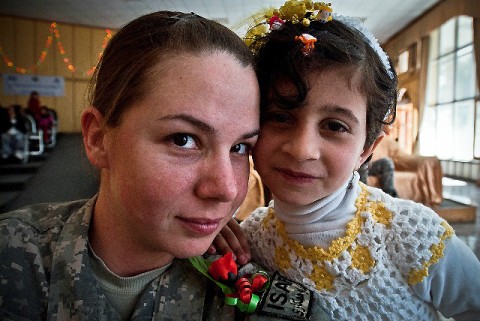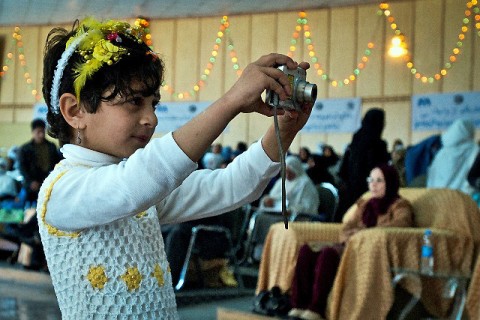Written by By U.S. Army Sgt. Ginifer Spada
Task Force Bastogne Public Affairs

 Nangarhar Province, Afghanistan – Raishea is a young Afghan girl of about 14. She has a shy smile and a soft voice. She is quite like most 14-year-old girls I know. Except that her reality in Afghanistan’s war-torn Nangarhar Province is something most people can’t fathom. I got the incredible opportunity to meet her last month in Jalalabad.
Nangarhar Province, Afghanistan – Raishea is a young Afghan girl of about 14. She has a shy smile and a soft voice. She is quite like most 14-year-old girls I know. Except that her reality in Afghanistan’s war-torn Nangarhar Province is something most people can’t fathom. I got the incredible opportunity to meet her last month in Jalalabad.
In Afghanistan, leaders have many hard decisions to make, and there are many gray areas. I don’t envy them as they plan the best route for their Soldiers. There is one area, for me at least, that is not gray – Afghanistan’s women, and in particular, its girls and their education.

Raishea was talking to female Soldiers and interpreters when I walked up to their group. She seemed very interested in the little parts of the Soldiers’ lives like what they did, how old they were, and whether or not they were married.
Raishea also gave an impromptu concert. Her voice was lovely and though I couldn’t understand the meaning of her words sung in her native Pashto, the beauty of them was undeniable.
Through an interpreter, Raishea and I talked about her life. She said one day she wanted to be a good journalist.
“That is how I will improve my life and be a witness to peacefulness in Afghanistan,” she said.
Wow. Not something that I thought about at 14. For girls like Raishea though, the future of their country is a very real issue. Knowing she cared so much about it was inspiring.
As a U.S. Army broadcast journalist deployed in support of Operation Enduring Freedom, I have a great job. I travel around the country and tell the story of our Soldiers here.
On March 8th, the story I was telling was less of our Soldiers and more of the women of Afghanistan. Women all over the world were celebrating the 100-year anniversary of International Women’s Day. They discussed their rights and tried to shed light on the areas that needed work.
In eastern Afghanistan, they gathered at the governor’s compound to give speeches, read poetry and sing. For a country that only a decade ago faced the harsh hand of the Taliban, these women seemed remarkably like the women I knew from home.

There was another little girl acting older than her frail body showed. She was very young, 6 or 7, about the same age as my niece. She spoke no English and didn’t bother to keep close track of her parents but was armed with a well-worn camera.
As the local media and I moved to video or photograph an interesting speech or group of children, this little girl was right next to us. She would run to the front of the group to ensure she had the best angle for her pictures. Dressed in a bright yellow ensemble, her dark curls secured closely to her small head with a barrette, she was not afraid of anything.
When others hung back from the governor, as to not intrude on the important man, she marched right up and snapped a few pictures. Then she proceeded to hop on the man’s lap as she passed her camera off to a willing man so that she could have her picture snapped. To me, she was so much like my own nieces, so much like the little girl that I once was. She seemed to have no idea that what she was doing seemed odd to many of the more traditional Afghans there. In her mind, she was every bit as deserving as the men who were running the cameras.
She is right. She is, to me at least, the future of Afghanistan.
I met her father later that afternoon. He was one of the photographers at the event, which explained why his little girl was so interested in taking pictures.
One day, years from now when I think of Afghanistan, I hope the painful parts will fade and the memory of the beacons of hope I saw that day in early March will be what I remember. They are the future here. They embody everything I think is right with this world, whether it is here in Afghanistan or at my own home in the United States.


